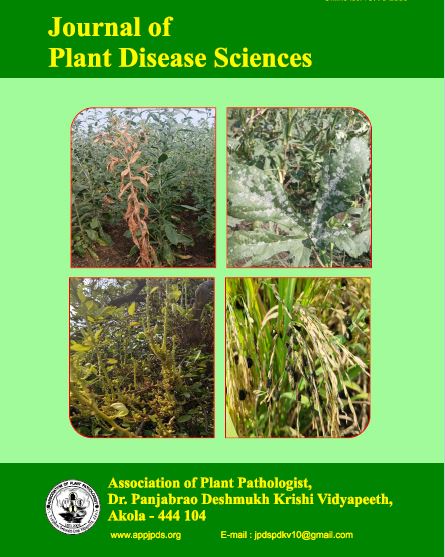Newer Systemic Fungicides For Neck Blast Disease Management In Rice
DOI:
https://doi.org/10.48165/Keywords:
Rice, Neck blast, Systemic fungicide, Incidence and YieldAbstract
Five newer and commercially available fungicides were evaluated during five Rabi seasons of Rabi 2012-13, Rabi 2013-14, Rabi 2014-15, Rabi 2015-16 and Rabi 2016-17 against neck blast disease (Pyricularia oryzae) of rice at Rice Research Station, Moncompu, Alleppey District, Kerala. The treatments were kresoxym methy l44.3 SC, tebuconazole 50% + trifloxystrobin 25% 75 WG, tebuconazole 250 SC, carbendazim 50WP with the standard check fungicide iprofenphos48 EC. The confirmative farm trials were conducted at six locations of Kuttanad region during Rabi 2017-18. The new generation fungicide molecule kresoxym methyl 44.3SC@ 1ml/liter water was found most promising fungicide in restrict the neck blast disease (7.84 %) and gave the maximum grain yield (7373 kg/ha) and followed by tebuconazole 250 SC @ 1.5 ml/liter water(8.87 % and 7168 kg/ha), respectively.
References
Awodera,V.A. and O.F. Esuruoso, 1975: Reduction in grain yield of two rice varieties infected by rice blast disease in Nigeria. Nigerian Agric J., 11:170-173.
Debashis Dutta,Supradip Saha, Deb Prasad Ray and Manas Kumar Bag, 2012: Effect of different active fungicides molecules on the management of rice blast disease. Intl. J. Agric. Env. Biotech., 5(3): 247-251.
Enyinnia, T., 1996: Effect of two systemic fungicides on the blast control in rainforest zone of Nigeria. Int. J. Pest Manage, 42: 77- 80.
Georgopoulos, S.G and B.N. Ziogas, 1992: Principles and methods for control of plant diseases, Athens,: 236 .
Gomez, K.A. and A.A. Gomez, 1984: Statistical Procedures for Agricultural Research. John Willey and Sons, New York, USA.,Pages: 640
Haq, I.M., M. F. Adnan, F.F. Jmil and A. Rehman, 2002: Screening of rice germplasm against Pyriculariaoryzae and evaluation of various fungitoxicants for control of disease.Pak. J. Pythopath., 14:32-35.
IRRI,2013: Standard Evaluation Systems for Rice, International Rice Research Institute, Manila, Philippines : 25-26.
Kumar, P.M.K. and A.L.Veerabhadraswamy, 2014: Appraise a combination of fungicides against blast and sheath blight diseases of paddy (Oryza sativa L.). J. Exper. Biol. Agricultural Sci., 2:49-57.
Mbodi, Y., S. Gaye and S. Diaw, 1987: The role of tricyclazole in rice protection against blast and cultivar improvement. Parasitica.43: 187-198.
Moletti, M., M.L.Giudici, E.Nipoti and B.Villa, 1998: Chemical control trials against rice blast in Italy. Informatore Fitopatologic, 38: 41-47.
Naidu, V.D. andG.V. Reddy, 1989. Control of blast (BI) in main field and nursery with some new fungicides. International Rice Research Newsletter, 14(4): 35.
Ou, S.H., 1985:Rice Diseases, CAB International Mycological Institute, Kew, Survey, UK.
Padmanabhan, S. Y., T. G.Abichandrani, N. K. Chakrabartiand S. Patnaik, 1962: Studies on Helminthosporium disease of rice. VI. Nutritional factors and disease expression- 2.Effect of potassium. Proceedings of the Indian Science Congress, Part III : 480.
Padmanabhan, S.Y., 1965: Estimating losses from rice blast in India. In the rice blast disease: Johan Hopkins Press, Baltinoie, Maryland. 203-221.
Rangaswamy, G., 1988 : Diseases of Crop Plants in India. Prentice Hall of India Pvt. Ltd., New Delhi, India, : 504.
Rohilla, R. U. and S. Singh, 1999: Mode of action of Carpropamid against rice blast caused by Magnaporthe grisea (Hebert). J. Mycol. Plant Path., 29: 159.
Sood, G.K. andA.S. Kapoor, 1997: Efficacy of new fungicides in the management of rice blast. Plant Dis. Res., 12: 140 –142.
TeBeest, D.O.,C. Guerberand M. Ditmore, 2007: Rice blast. The Plant Health Instructor. DOI: 10.1094/ PHI-I-2007-0313-07. Reviewed 2012.
Thomas, P.M., 2002: Problems and prospects of paddy cultivation in Kuttanad region. A Case Study of Ramankari Village in Kuttanad Taluk, Draft Report, : 20.
Tirmali, A.M., S.B.Latake andN.J. Bendra, 2001: Evaluation of new fungicides for control of blast disease of rice. J. Maharashtra Agri. U., 26:197- 198.

